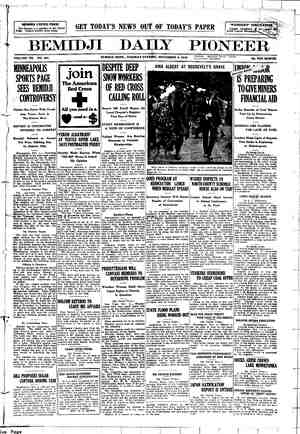The Seattle Star Newspaper, November 4, 1919, Page 11
You have reached the hourly page view limit. Unlock higher limit to our entire archive!
Subscribers enjoy higher page view limit, downloads, and exclusive features.
THE SEATTLE STAR.—TUESDAY, NOVEMBER 4, 1919. Rotary Stands For AMERICANISM This City Shall Not Be Dominated by an Autocracy of Radicalism Seattle MUST grasp her opportunity to becomeagreat city. Seattle MUST do her duty by the United States and the world by producing allshe can produce in all lines to meet pressing needs. Un-American conditions, which prevent Seattle from meeting the present emergency and becoming a great industrial city, MUST BE CHANGED. The Seattle Chamber of Commerce and Commercial Club has adopted a declaration of principles, based on Americanism, which, put in force, will end the domina- tion of industry in this city by radicals. THAT DOMINATION MUST BE ENDED, for it has so restricted production and increased production costs and the cost of living in Seattle that it is driving new in- dustries, new people and new business away. It has so increased the cost of production that Seattle industries can no longer compete with those of other cities. The directors of the Rotary Club of Seattle unanimously adopted the declaration of the Chamber of Commerce and have made it their own. This action has been over- whelmingly ratified by a referendum of the membership representing every line of legitimate business and pro- fession in the city. FOLLOWING IS THE DECLARATION OF THE ROTARY CLUB: Declaration on Industrial Situation by the Rotary Club of Seattle 1. Absolute fairness to employe and employer alike is one of the foundation principles on which American- ism rests. 2. The Rotary Club of Seattle will work for the im- provement of industrial relations, the elimination of class prejudice, which generally results from misun- derstandings, and the establishment of equitable and uniform working conditions fair alike to employe and employer. 3. It will always use its united influence in opposi- tion to injustice, whether practiced by employers or employes. 4, It stands for the American plan, which meansab-’ solute fairness to all classes of workers, whether union or non-union. It unalterably opposes the “clos- ed shop,” which shuts the doors of industry against the American workingman who is not a member of a labor organization. 5. It is un-American to interfere with the personal ‘rights and constitutional liberties of the individual. Therefore, we shall oppose the use of force or intimi- dation by any one endeavoring to persuade workmen either to join or to resign from a labor organization. 6. It holds that both the employe and the employer are privileged to terminate their relations whenever either chooses to do so, unless, of course, there be con- tracts between them. 7. It does not countenance limitation of theamount of work which may be accomplished in a given time, or the manner in which payment shall be made for such work, whether by hourly rate, piece work, con- tract or otherwise. We believe that every workman should have an opportunity to earn a wage propor- tionate to his ability and productive capacity. 8. By encouraging fair dealings and broad-minded policies, this organization hopes, with the co-opera- tion of Seattle’s thinking public, to bring about work- ing conditions and wages which will make Seattle known as a good city in which to work, to live, and to raise children. Adopted by Board of Directors, October 29, 1919. H. R. KING, President. FRED EVERETT, Vice-President. Cc. A. PHILBRICK, Treasurer. TRUSTEES: A. J. Izzard, D. W. Jenkins, A. W. MeCord, L. A. Partridge, Roger Sands, E. P. Tremper, W. L. Waltz, W. A. Wicks, Worrall Wilson. Attest: T. L. MONSON, Secretary.





